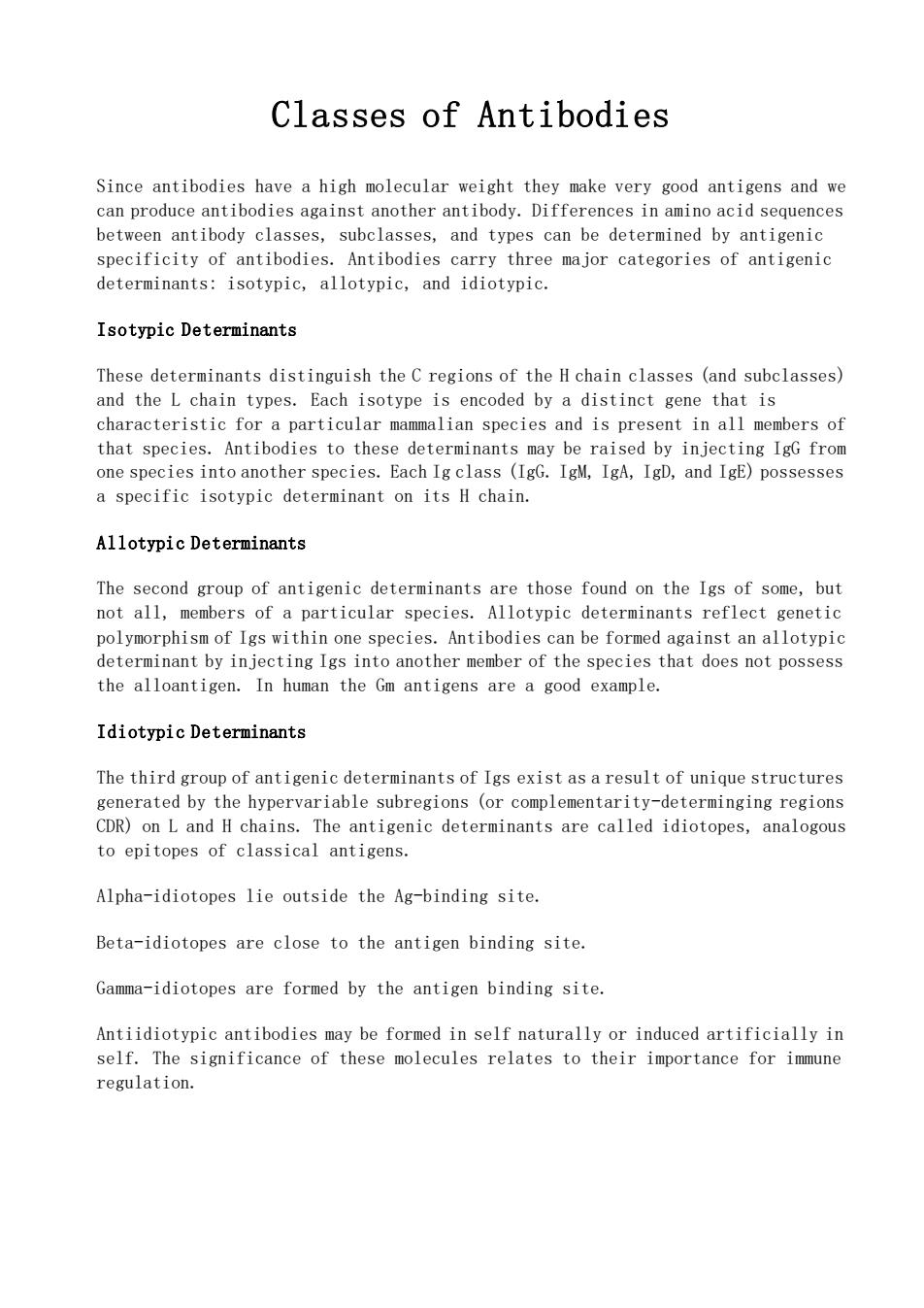正在加载图片...

Classes of Antibodies Since antibodies have a high molecular weight they make very good antigens and we can produce antibodies against another antibody.Differences in amino acid sequences between antibody classes,subclasses,and types can be determined by antigenic specificity of antibodies.Antibodies carry three major categories of antigenic determinants:isotypic,allotypic,and idiotypic Isotypic Determinants These determinants distinguish the C regions of the H chain classes (and subclasses) and the L chain types.Each isotype is encoded by a distinct gene that is characteristic for a particular mammalian species and is present in all members of that species.Antibodies to these determinants may be raised by injecting IgG from one spe ies intoanother species.Each I class (IgG.IgM,IgA,IgD,and IgE)possesses a specific isotypic determinant on its H chain. Allotypic Determinants The second group of antigenic determinants are those found on the Igs of some,but not all,members of a particular species.Allotypic determinants reflect genetic the alloantigen.In human the Cm antigens are a good example. Idiotypic Determinants The third group of antigenic determinants of Igs exist as a result of unique structures generated by the hypervariable subregions (or complementarity-determinging regions CDR)on L and H chains.The antigenic determinants are called idiotopes,analogous to epitopes of classical antigens. Alpha-idiotopes lie outside the Ag-binding site. Beta-idiotopes are close to the antigen binding site. Gamma-idiotopes are formed by the antigen binding site. Antiidiotypic antibodies may be formed in self naturally or induced artificially in self.The significance of these molecules relates to their importance for immune regulation. Classes of Antibodies Since antibodies have a high molecular weight they make very good antigens and we can produce antibodies against another antibody. Differences in amino acid sequences between antibody classes, subclasses, and types can be determined by antigenic specificity of antibodies. Antibodies carry three major categories of antigenic determinants: isotypic, allotypic, and idiotypic. Isotypic Determinants These determinants distinguish the C regions of the H chain classes (and subclasses) and the L chain types. Each isotype is encoded by a distinct gene that is characteristic for a particular mammalian species and is present in all members of that species. Antibodies to these determinants may be raised by injecting IgG from one species into another species. Each Ig class (IgG. IgM, IgA, IgD, and IgE) possesses a specific isotypic determinant on its H chain. Allotypic Determinants The second group of antigenic determinants are those found on the Igs of some, but not all, members of a particular species. Allotypic determinants reflect genetic polymorphism of Igs within one species. Antibodies can be formed against an allotypic determinant by injecting Igs into another member of the species that does not possess the alloantigen. In human the Gm antigens are a good example. Idiotypic Determinants The third group of antigenic determinants of Igs exist as a result of unique structures generated by the hypervariable subregions (or complementarity-determinging regions CDR) on L and H chains. The antigenic determinants are called idiotopes, analogous to epitopes of classical antigens. Alpha-idiotopes lie outside the Ag-binding site. Beta-idiotopes are close to the antigen binding site. Gamma-idiotopes are formed by the antigen binding site. Antiidiotypic antibodies may be formed in self naturally or induced artificially in self. The significance of these molecules relates to their importance for immune regulation